|
Taking Lunch
How to Adapt to Office Life in France
By Matt Scott
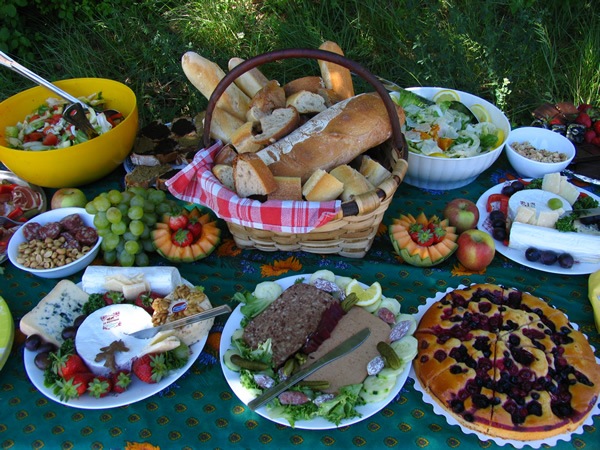
|
|
An office lunch when working in France can seem as elaborate, relaxed, and delicous as a picnic.
|
"It’s time for lunch!"
So my boss announced as she popped her head around the door leading to my workspace.
I’d been working for the company for many months, and up until now had always worked remotely. But I’d recently been promoted and was to be based in the European office from now on. As it was my first day in this role, I was keen to show that I was a hard worker.
"I’m good thanks. I have some work to get on with so I will just eat here."
I knew all my colleagues well, and wasn’t worried about them thinking I was unsocial, so I began to rummage around in my bag for a sandwich as I turned back to my computer, trying to find the appropriate look of professional seriousness.
"Sorry Matt, everyone must eat together. We are already late."
Causing offence on your first day is generally not the best way to start so I dutifully followed Sarah, my new boss, to the lunch room.
"We all stop at 12:30 on the dot and eat together each day," she explained as we entered the small room busy with people grabbing food from the back of the fridge, finding plates in the cupboard, and preparing the coffee machine.
The office is close to the town of Avignon, in the south of France. From the window of my office, there are striking views across to Mount Ventoux — one of the climbs frequently taken in the Tour de France, and rated as one of the hardest. Just across from the office are huge corn fields, the borders filled with bright red poppies that have been blooming for many weeks, in a beautiful contrast to the yellow corn. While the company is based on an industrial estate in a busy suburb, just a few minutes’ walk away there is a small bakery, which wafts the smell of freshly baked bread into the office. I’m already planning to buy a baguette when I leave work, and I don’t expect there to be much left when I get home. My stroll back home from work, wherever I am in France, typically involves eating chunks of the beautifully warm, soft dough. If there is any left when I get home, I usually grab the butter and enjoy watching it disappear into the still warm dough, before consuming the rest.
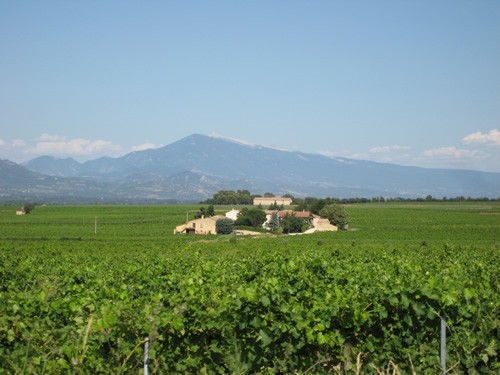
|
|
A view of vineyards with Mount Ventoux in the background in Provence where the author was working.
|
Dining at Work in France
As I took a seat at the communal table, I heard the distinct sound of something frying in hot fat. I turned around to see Isabelle, the office manager, drop a piece of fresh fish into the pan. Ben, the operations assistant was next to her, rapidly stirring a pot of sauce.
Looking around, the rest of the office was beginning to find seats and open steaming containers of meat and potatoes, pasta, or exquisite smelling stews.
"I never have the time to cook anymore," pronounces Sylvie, the accountant, as she takes a seat next to me with a large bowl full of fresh greens, walnuts, goat cheese, roast peppers, and chicken. "This is all I can manage." Her dish looks delicious and better what I can come up with after an hour in the kitchen.
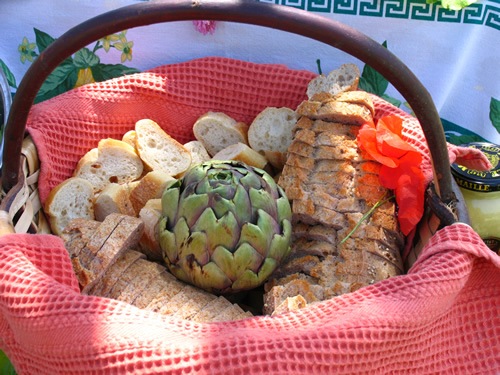
|
|
You seldom go without fresh bread for lunch, even at the office.
|
I fish out the sandwich I brought from home from the bottom of my bag and it instantly flops out of my hand as I take it out of the plastic wrapping, as a piece of limp lettuce drops onto the table. My lunch looks distinctly out of place. While this morning I'd be proud of myself for taking the extra moment to add some greens to accompany my ham, I begin to realize they do things a little differently here.
As a small company, we only have a small lunch room in which to eat, but there is a fully equipped kitchen. The majority of large companies have a cafeteria on site, offering a range of food choices you’d be happy to find in any casual restaurant. For companies of a certain size that don’t offer onsite dining, employees are entitled to "ticket restaurant," which is essentially gift voucher allowing employees to eat out. Depending on where you work, you receive tickets worth between €7-€10 ($8-11) for each day you work, which you can either spend at a local café or restaurant during your lunch break, or save up for a meal at the weekend with friends or family.
While there are certainly those that spend their "tickets" at McDonalds or some other such fast food joint, many will enjoy a full meal — more often than not, two or three courses — in a local café or restaurant almost every day. The obsession with good food in France does not stop when you’re at work.
"So how’s the project going?" I ask Martin, an American expat who is sitting opposite me. I notice a few heads look up at me and there is a pause in the conversation. Martin looks around, appearing a little embarrassed. What happened to the project that I didn’t know about?
"Umm, we don’t talk about work at lunch Matt," he announces quietly, but not quietly enough that I see all heads nod in agreement.
"When we’re eating lunch, we forget about work," Sarah adds. "If you talk about work you need to put a Euro in the box," she indicates with her head towards the equivalent of a swear box in the corner of the room. "But it’s pretty much only visitors and new guys that make that mistake," she smiles before adding that "lunch is about getting away from work! But we’ll let you off as it’s your first day."
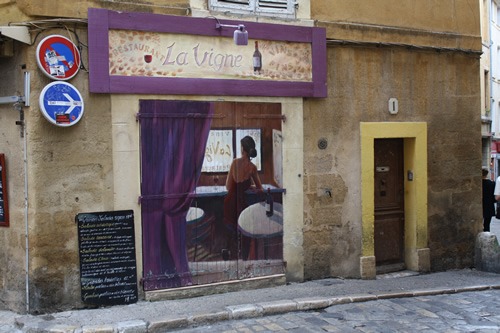
|
|
A typical restaurant in small town France where you could have lunch.
|
We are a mix of foreign and French staff. As a UK citizen (and a member of the EU at the time), I don’t need to worry about a working visa. There are employees from the U.S. and Canada, and all but one has married a French partner, and so has obtained the right to work here legally. While some of the staff speak only a little French, and others almost no English, most of us are bilingual. However, there is no "official" office language. Instead, we adapt to each situation, typically adopting the mother language of the weakest speaker. This means we often change between French and English as people leave or join a conversation or meeting. Still, it's not uncommon to hear two Americans speak French together, for example, or for impromptu language lessons to start as a certain word or concept are introduced to a conversation. There is an eclectic mix of accents and fluencies, which adds to the vibrancy of the office culture.
After working in France for some time now, I realize that I’d learned certain words and jargon in one language and had no idea what the translation was in the other, and so was often forced to swap languages for just one or two words in order to make myself understood. My colleagues often did the same, but it rarely caused any confusion — typically the opposite in fact.
While communication constantly in two languages wasn’t always easy, it made a real contribution to cooperation and team bonding on both a personal and professional level, but I don’t believe this was ever anyone’s intention.
Isabell and Ben take a seat next to me with a plate of fried fish, pasta, and fresh tomato sauce. It smells delicious.
"Do you always cook like this," I ask in an attempt to hide my feeble sandwich behind my hand in embarrassment.
"Of course, I am French," Isabelle announces with a little smile. "I'm not," adds Ben, nodding towards my sandwich "But it’s much better like this."
"Sometimes we all cook together," Isabelle tells me, looking sympathetically at my lunch.
"We all bring in some ingredients and help cook up a big meal" chips in Sylvie. "It means we usually take a little longer over lunch, but as long as the boss gets seconds it’s usually OK." I notice Sarah shake her head with a little smile on her face.
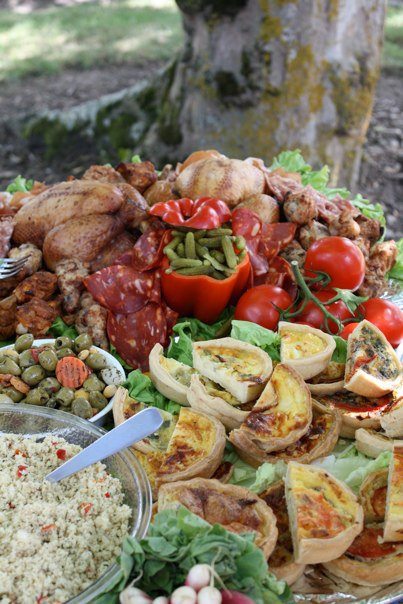
|
|
OK, this is a bit more elaborate than the typical office lunch...
|
The 35-Hour Workweek in France: Myth and Reality
I was well aware of the term of the "35-hour workweek." It was often mentioned whenever the subject of working in France was brought up back home. Introduced into French law by the former Prime Minister Lionel Jospin, the idea behind the concept was to stimulate job growth. The idea was that with a shorter work week businesses would be more likely to hire additional staff to make up for the lost production time.
While the 35-hour workweek is strictly practiced in some companies, in reality many employees still actually work longer hours, instead offering additional time off, higher pay, or other perks to compensate for the extra hours. While there are certainly strict rules regarding virtually all aspects of employment and employees rights, just like almost everywhere else in the world, if there is a job to be done and you are in any position of responsibility, it will need to get it done regardless of the time. And as in so many companies around the world, it is the dedication and ethics of the staff that help drive the business forward, regardless of financial gain or bureaucratic rights.
Nonetheless, there is a very strong focus on work life balance in France and it is rare that employees feel obliged to stay at their desks extra hours simply to impress the boss. Employees will also rarely hesitate to question their employers, or if necessary call in employment inspectors, if they feel they are being taken advantage of and they do so with little risk to their careers. Workers have extensive rights in France, which typically keeps employers close to the law, but can regularly lead to disruptions for the entire country if workers’ rights or wishes are not respected — as anyone who has been in France during a transport strike will probably have noticed.
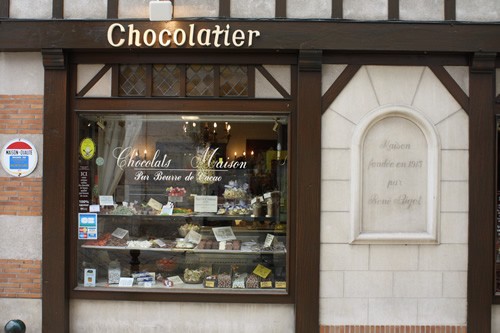
|
|
You can always stop by a Chocolatier on the way back from work if you so desire...
|
La Bise
Just as we are finishing off our meal, Kelli, the marketing manager, joins us. She has come in late today so it’s the first time I’ve seen her in several months. I stand up to give her a kiss — la bise as it’s known here — careful to kiss three times, as is the tradition in the south, as opposed to just two kisses in Paris (or sometimes four, depending on the situation and person). It’s a complicated system to master, and I frequently leave people, lips poised, hanging in empty space for their additional kiss as I have already stopped one short of what they were expecting.
France is a country full of traditions and cultures and there appears to be etiquette for almost any situation. Despite how often the French tend to kiss, however, there appears to be no "right" way to do so, nor a defined cheek (left or right), that one should start this kiss on. I typically begin on the left, but this is not the same for everyone and mistakes can lead to uncomfortable moments: a last second indecision on either person’s part can see heads rapidly moving from side to side as each party attempts to find a cheek. On more than one occasion I’ve gone in too fast and lips have touched, which was exactly what happened the first time I met my mother-in-law. I still shudder in embarrassment when I think of this.
It is not uncommon for male friends, and especially family members to do la bise as well. This was something I was just getting used to; trying to learn the subtleties of when it was, and when it was not, appropriate to kiss another man on the cheek; another cultural minefield which I was just a beginning to learn to navigate, though thankfully meetings with my father-in-law had been relatively successful in that department.
Kelli continues her turn doing le bis around the table. I’m about to question if she’s been away, before realizing that this is a frequent occurrence in offices every morning.
It’s not uncommon for workers arriving in the morning to ensure that they greet each of their colleagues personally, with a kiss or handshake as appropriate. I find this courtesy a charming way to start the day, and as a small office it will only take me a few minutes each morning. My wife however works in an office of almost 150 people and must follow the same protocol each day. Who knows how many man hours are wasted each day doing le bis, and I can only imagine what happens once flu season starts.
Everyone around the table finished their post-lunch espressos and begin to head back to work. I’d been anxious all lunch about my workload building up and found it hard to enjoy my break without worrying about the consequences.
I’d spent many years working in an environment where, if you were busy (which I almost always was), a lunch break would be nothing more than eating at my desk while going over emails or reports, while dribbling mayonnaise on the keyboard and frantically trying to keep up with the ever mounting workload. While I admired the principle of the long lunch, and can only agree with its benefits, it would take some time to adjust.
The French, on average, work less hours than most other developed nations, and while the country is not the highest in terms of GDP per capita (according to the OECD France is behind the US and Australia for example). Yet when broken down into GDP per hour worked, France is among one of the most productive nations in the world. It seems as if even the experts are divided about the reasons behind the phenomenon however, with many citing such reasons as long lunch breaks and shorter working days helping to keep employees focused and motivated.
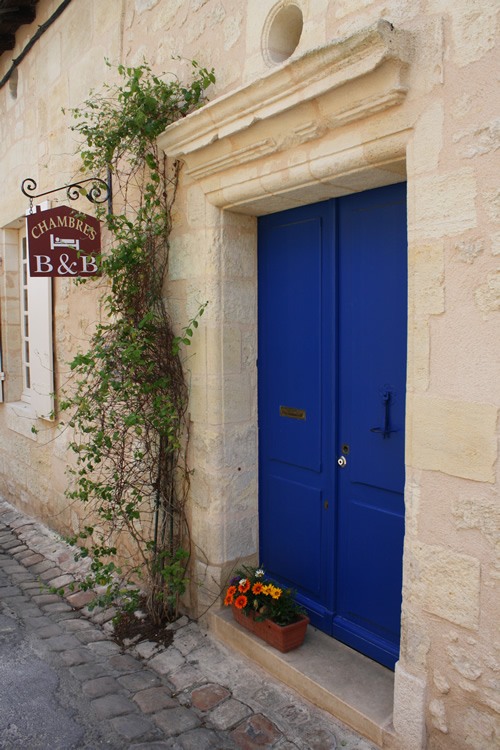
|
|
Visitors to Provence and elsewhere in France can stay at a relaxed local bed and breakfast.
|
I arrive back in my office, and as I move the mouse and computer screen lights back up the first thing I notice is the small bold writing indicating the 24 emails received while I’d been at lunch. I sit down and start my afternoon, really hoping they are right about this long lunch break theory!
More Information on Living and Working in France
The Alliance Française
An organization dedicated to the promotion of French language and culture around the world.
Fluent U
A blog dedicated to learning French language and culture, with some great tips to help you master the language.
FUSAC
The Paris-based magazine for English speakers, with articles on living and working in France, as well as job vacancies.
French Property
A blog about living and working in France, with an excellent focus on buying property or setting up your own business.
Expatica (France)
A site full of helpful advice, tips and articles for those working or studying in France (and other countries).
|
Matt Scott, born in the U.K., has spent much of his life traveling and working abroad. Matt's articles and photos have been widely published.
|
